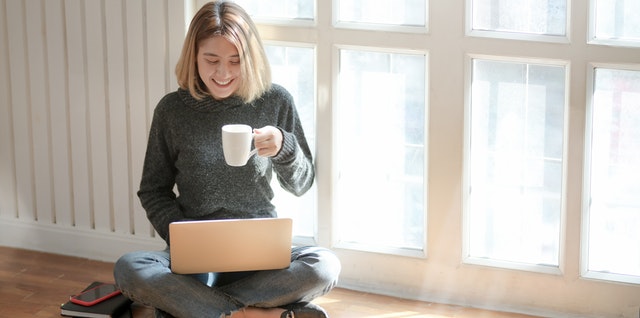In this article, we will go over some common nighttime habits which can promote insomnia so you know what to avoid. But first, here’s a quick tip. No matter what your lifestyle is, you may be able to get to sleep faster and enjoy more restful sleep by taking a highly-rated natural supplement like SERENITY Natural Sleep Aid by Eu Natural.
SERENITY contains zinc, magnesium, vitamin B6, valerian, passionflower, magnolia chamomile, L-Theanine, and other healthy ingredients which promote restful sleep.
Now, let’s talk about late night habits which you should avoid if you want to fall asleep fast and stay asleep.
1. Eat too much late at night.
Snacking before bed isn’t always a bad idea, depending on who you are (for some people, it might help to prevent migraines, for example).
But you should be mindful of your portion sizes as well as what you are snacking on. If you eat too much too late at night, or you eat foods which are hard to digest, doing so is bound to keep your digestive tract busy and make it harder to fall asleep.
In particular, steer clear of spicy foods or other foods and beverages which might give you acid reflux.
2. Drinking caffeine or alcohol too late.
Along with watching what you snack on late at night, you should also be careful what you drink, and how much of it. A hot cup of coffee might sound appealing at night, but it could keep you awake. In fact, that can happen even if you have a cup of coffee as early as four o’clock in the afternoon.
As for alcohol, even though it is a downer, it doesn’t help you get better sleep. As explained in Psychology Today, “In the body, alcohol disrupts circadian functioning, directly interfering with the ability of the master biological clock to synchronize itself. Because circadian rhythms have such a powerful, dominating influence over the way our bodies function, the disruptive effects of alcohol can be widespread, affecting sleep and other systems.”
Additionally, how much you drink of any fluid also could have an impact on how much sleep you get.
You should go to bed hydrated. But if you drink too much, even if it is just water, you could end up staying awake because you have to keep running to the bathroom.
3. Exposing yourself to blue light.
If the last thing you do before you head to bed is use your computer or watch TV, there is a chance that habit is also keeping you awake.
The phenomenon is known as “blue light insomnia.” As Harvard Medical School explains, ” While light of any kind can suppress the secretion of melatonin, blue light at night does so more powerfully. Harvard researchers and their colleagues conducted an experiment comparing the effects of 6.5 hours of exposure to blue light to exposure to green light of comparable brightness. The blue light suppressed melatonin for about twice as long as the green light and shifted circadian rhythms by twice as much (3 hours vs. 1.5 hours).”
If you suspect that you might be experiencing blue light insomnia, there are a couple things you can do.
The first option is to adjust your habits so that you are not looking at screens for at least several hours before bed. The second option is to wear glasses which block blue light, but otherwise go about your regular activities.
4. Doing things or thinking about things which make you anxious.
Another common mistake which can keep you awake at night is engaging with matters which make you anxious before you go to bed.
It can be hard not to do this, especially if you are dealing with financial troubles or other dilemmas which require you to take evasive action. You might find yourself slipping into problem-solving mode at all times of day.
But if you go to bed with these types of problems on your mind and you are actively engaged in trying to solve them, you are sending your brain and body the message that it is not safe to shut down and go to sleep.
Anxiety is not the only emotion which can have this effect. Excitement can feel quite similar to your body and brain, so you might also want to steer clear of activities which excite you before bed as well.
Instead, you should replace these activities and thoughts with those which help you to relax and disengage.
A good choice is any activity which helps you to get into the psychological state known as “flow.”
Psychology Today says, “Flow is a cognitive state where one is completely immersed in an activity—from painting and writing to prayer and surfboarding. It involves intense focus, creative engagement, and the loss of awareness of the self.”
When you stop focusing on your ego and your problems, your body and brain get the message that it is safe to drift off to sleep.
Replace Bad Habits With Good Ones and Get Better Sleep
Now you know some habits you may have which might seem innocuous, but which might be standing in the way of restful sleep.
Avoid these bad habits and try replacing them with healthier choices in the hours leading up to bedtime. Pair up better habits with SERENITY by Eu Natural, and give your body and mind a little time to adjust to your routine. Hopefully, you will soon be drifting off quickly and staying asleep longer.



